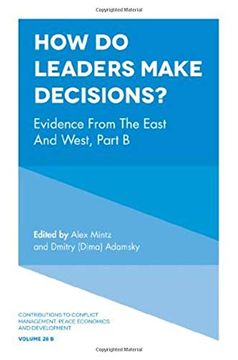How do Leaders Make Decisions? Evidence From the East and West, Part b: 28 (Contributions to Conflict Management, Peace Economics and Development) (en Inglés)
Reseña del libro "How do Leaders Make Decisions? Evidence From the East and West, Part b: 28 (Contributions to Conflict Management, Peace Economics and Development) (en Inglés)"
Understanding how leaders make foreign policy and national security decisions is of paramount importance for the policy community and academia. Yet on their own, neither rational nor cognitive schools of decision-making analysis offer totally convincing results, and in any case, rigorous decision analysis methodologies are rarely, if ever, applied to the decisions of world leaders. How Do Leaders Make Decisions?: Evidence from the East and West, Part B, the second in a two-part volume covering a total of ten world leaders, fills this gap by using the Applied Decision Analysis (ADA) method to explore how figures such as Putin, Erdogan, Khaled Mashal, Mao, and Saddam Hussein make or made major decisions of international significance. By analysing the decisions made by key political figures around the world, past and present, the chapters gathered here shed light on how they are reached and what policy implications they have for their own and other nations. The analyses are based on traditional and contemporary theories of foreign policy decision making, including, but not limited to, the rational actor model, the cybernetic theory of decision, poliheuristic theory, and various decision rules, including the elimination-by-aspect rule and the lexicographic decision rule. Cumulatively, what these chapters uncover is that foreign and national security policies can be best explained by tracing the cognitive process leaders go through in formulating and arriving at their decisions. For its groundbreakingly rigorous methodology and its unprecedented scope, this book and its companion book are essential reading for students, scholars, and policymakers alike.

